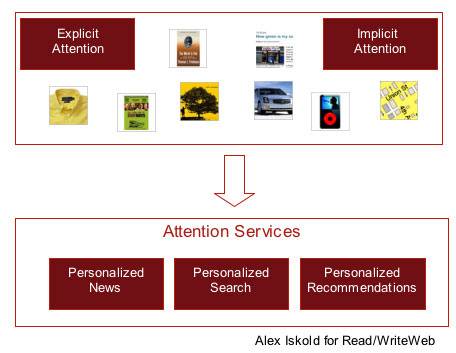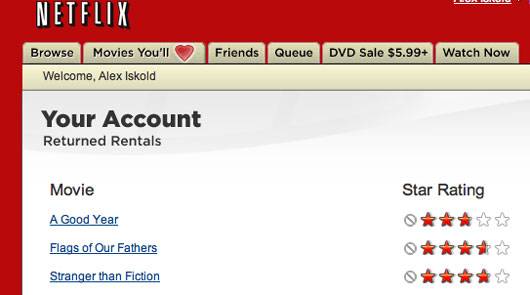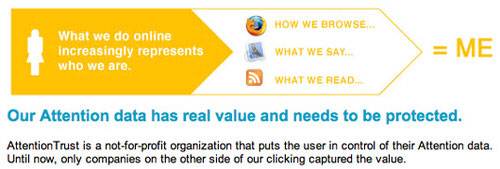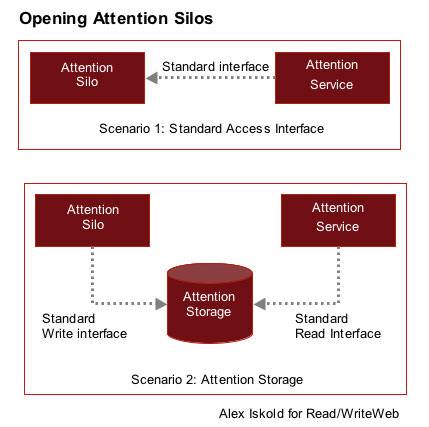We have written extensively at Read/WriteWeb about Attention and the Attention Economy.
As a concept attention makes sense to anyone who is online today. We know when we are paying attention and we know what we are paying attention to.
The problem is that the information about our attention is not readily available to us afterwards. The premise of the Attention Economy
is that people are in control of their attention information. This control lets them use the information to receive
utility and services.

The reality is that our attention information is scattered all over the web, bits of it lying in different silos. Anytime we buy books, rent movies, click on pictures or listen to music
the information is recorded and stored. Each vendor makes an specific effort to capture what we liked, but
most do not make much effort to help us get this information out of their system. And why should they? After all,
that consumer information is a competitive advantage for each business. Breaking existing attention silos and creating
a real attention economy appears to be a complex, if not impossible task. In this post we will take at broad look
at the problem in attempt to figure out what can be done.
The Basics of Attention
As we interact with information we reveal our attention. The attention can be explicit or implicit.
A basic example of an explicit attention is bookmarking a page or rating a movie. An example of implicit
attention is visiting the same page many times or spending time reading an article. Attention information is
very valuable because it reveals our interests. People wrongly think of attention information as beings useful
only for advertising and marketing. Instead, our attention information should be thought of as a personal filter
than can be used in many contexts.

For example, a list of books that you purchased on Amazon can be used by a service that filters
new book releases for you. Another example is a search engine that knows what movies you already rented on
Netflix, so when you search for new movies it can show you only ones you haven’t seen. Or perhaps, a shopping application that recommends electronic gadgets to you based on your previous purchases.
To learn more about modern recommendation engines, please read our previous post on the subject.
The take away here is that filtering
and recommendation are really two sides of the same coin. But the reason attention information is so important is
because in our fast-paced world, having personalized filters can save us a lot of time.
Attention Silos
At a quick glance there maybe nothing wrong with the way things are today. For example, you can login to Amazon
and see your order history, you can see what you rented on Netflix or what you bought on eBay. The problem is
that the information is not readily portable and not readily available via a common interface. Because of this,
managing your attention information is practically impossible.

Consider a different industry – banking. Each bank makes your recent financial transactions exportable
in a few formats – pdf, comma separated, Excel, etc. An export in Excel is actually an interesting example, because
it illustrates how your information can be leveraged. By exporting information from your bank and credit card into
Excel you are able to take it to your financial adviser who can in turn analyze it. The point is that your financial information
is portable.
On the other hand your Netflix rental history is not. You can argue that it is possible to copy and paste
it out of Netflix, but the cost of doing this is prohibitive for individuals. In fact your Netflix rental history is a
classic example of how all of today’s attention silos deal with information. The information is available, it is
just not easy to export it or direct to another service because of its format. Netflix and others likely store
the information in the relational databases, but they expose it only as HTML. Effectively, this makes
the information useless to individuals who would like to use it to receive other services.
Who Owns the Attention Data Anyway?
Before looking at what can be done to unlock the attention information, it makes sense to ask if this is
even a valid thing to do. Consumers who are aware of the issue and want to participate in the Attention Economy
feel strongly about ownership of personal information.
However, the matters are not simple, and likely less favorable
to consumers that one might think. When we sign up for services like Amazon or Netflix in the fine print we are
are agreeing to their terms of service. Typically, it is stated explicitely that the behavioral information belongs
to business and not individuals. After all these companies are offering us a service.
On the other hand, this is a private information that they hold hostage. Clearly, in the case of the financial
industry not being able to export information would be outrageous. So what is the difference between my bank
and Amazon? Not much as far as I am concerned, since I transact with each and view each as a service.
An Attention Organization
Because the matters are so complex and unclear we need an organization and law makers to step in and
define the rules of engagement. A non-profit called Attention Trust
made an early attempt to define the principles of attention on behalf of consumers. The principles that it laid out
ensure that the user is in control and, thus, made the Attention Economy possible. Unfortunately today the organization
is stagnating and has not made much progress lately in getting adoption in the industry.

Assuming that Attention Trust can make a come back or another organization can take over the effort,
the crux of the problem is not only to formulate the principles of attention, but also to
lobby lawmakers and get the industry to reach a consensus. Even more importantly, there needs be a set of standards
focusing on attention.
An early example of a standard is Attention Profiling Markup Language (APML),
which focuses on making consumer attention portable. It is certainly a step in the right direction, but it is not rich enough
to capture semantic attention. For example, there is no concept of a book or a movie, the attention is represented
as a set of tags. Such approach would make it impossible to build specific filters for things like books and movies.
Attention Standards
The technical details aside, the fact is that it is better to have an incomplete standard than no standard at all.
To get us to the real attention economy we need a set of standards that would facilitate it. First, each
silo that captures a users attention needs to provide an interface to access it.
This can be done in two
ways, either by storing information in proprietary format and implementing a standard way for other services to fetch it or
by writing the attention information directly into a standard, outside attention store. The latter solution is much better
technically, because it would uncouple attention capturing from attention services. However, it is unlikely that
companies like Amazon and Netflix would go as far as storing their customer information in an outside web service.

Beyond the standards for storage, there need to be format standards which define attention metadata.
The simplest example of such format is line-based format used by the Attention Recorder extension offered by Attention Trust.
This format captures a timestamped click stream with the user’s browsing activity. The problem is that this format
is not rich enough to capture complex interactions like buying a book or renting a movie. The format needs to be extensible
to incorporate new kinds of objects. RDF is a natural choice but the challenge is to agree on specifics.
Conclusion
The Attention Economy is an interesting, intriguing concept that remains a fairly elusive in reality.
To enable individuals to control the information which is currently locked in silos all over the web is a daunting and somewhat unapproachable task. Modern services like del.icio.us and Flickr recognize the importance
and the benefits of being good citizens and letting other services access their information, but
among older web players opening up this way is a taboo.
If the Attention Economy is ever going to happen, there needs to
be a strong organization forcing it along. The organization needs to drive a set of technical standards
and advocate the adoption both to the law makers and the businesses.
What do you think can be done?
Is global Attention Economy on the web important to us or can we do without out?









